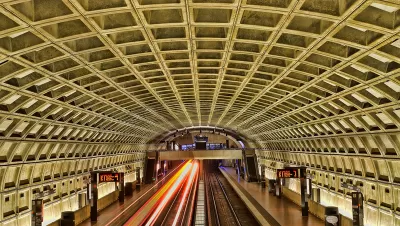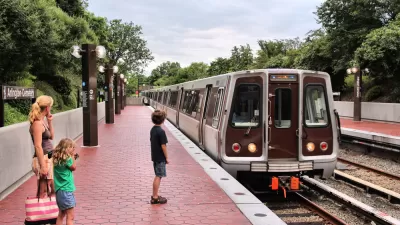The state of Virginia won't let Washington Metro increase services that surpass a three percent subsidy cap implemented this summer.

Max Smith reports on a looming political battle between the state of Virginia and the Washington Metropolitan Area Transit Authority (Metro) over proposed service increases proposed in a draft released in December 2018 and first discussed in October 2018.
The Northern Virginia Transportation Commission recently sent a letter to Metro officials warning them about the potential consequences of implementing the service changes:
"While the Northern Virginia Transportation Commission supports efforts to increase ridership, including cheaper unlimited-ride passes, the letter — due to be approved next month — warns proposals to extend trains to provide more service at stations along the Red, Yellow and Green Lines without significant savings elsewhere would run up against a new legal cap on cost growth.
Supporters of the service increases argue that improvements are necessary to attract riders back to the struggling system.
Regarding more details of the proposed service improvements, Smith explains:
The additional weekday service is one of several potential increases next summer, but Metro estimates it would cost $5.4 million on top of other expenses already accounted for in the budget. Other proposals, if the Metro Board can fund them, include $3.6 million to extend all Yellow Line trains to Greenbelt, $1.2 million to run more Red Line trains past Silver Spring to Glenmont, and $10.1 million to continue moving toward more 8-car trains.
FULL STORY: More Metro trains at your stop could hit roadblock over Va. funding

Planetizen Federal Action Tracker
A weekly monitor of how Trump’s orders and actions are impacting planners and planning in America.

Map: Where Senate Republicans Want to Sell Your Public Lands
For public land advocates, the Senate Republicans’ proposal to sell millions of acres of public land in the West is “the biggest fight of their careers.”

Restaurant Patios Were a Pandemic Win — Why Were They so Hard to Keep?
Social distancing requirements and changes in travel patterns prompted cities to pilot new uses for street and sidewalk space. Then it got complicated.

Platform Pilsner: Vancouver Transit Agency Releases... a Beer?
TransLink will receive a portion of every sale of the four-pack.

Toronto Weighs Cheaper Transit, Parking Hikes for Major Events
Special event rates would take effect during large festivals, sports games and concerts to ‘discourage driving, manage congestion and free up space for transit.”

Berlin to Consider Car-Free Zone Larger Than Manhattan
The area bound by the 22-mile Ringbahn would still allow 12 uses of a private automobile per year per person, and several other exemptions.
Urban Design for Planners 1: Software Tools
This six-course series explores essential urban design concepts using open source software and equips planners with the tools they need to participate fully in the urban design process.
Planning for Universal Design
Learn the tools for implementing Universal Design in planning regulations.
Heyer Gruel & Associates PA
JM Goldson LLC
Custer County Colorado
City of Camden Redevelopment Agency
City of Astoria
Transportation Research & Education Center (TREC) at Portland State University
Camden Redevelopment Agency
City of Claremont
Municipality of Princeton (NJ)





























